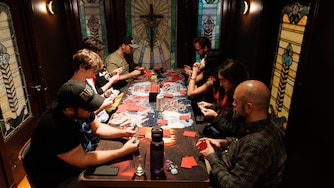Dressed in a creamy green blazer with pink sheath, Kara D. Beverly joined several hundred attendees this month at La Familia Soundstage, a Black-owned event space in Mount Vernon. A hulking screen blaring the presidential debate was the focal point of the dimly lit room.
She wore the colors of the Alpha Kappa Alpha Sorority Inc. to witness the first woman of Black or Asian descent to become the Democratic nominee for president. Kamala Harris is also an AKA and Beverly feels a special sisterhood with her.
Others in attendance wore the colors of other Black sororities and fraternities that make up the Divine Nine, or D9, which are the number of recognized organizations under the National Pan-Hellenic Council. Some also wore the colors and logos of historically Black colleges and universities in another show of allegiance to Harris, who attended Howard University.
“I was prepared to support the Democratic nominee no matter who that person was,” said Beverly, who spoke as a private citizen and not on behalf of the sorority. As a nonprofit, the sorority does not endorse candidates. “The fact that Vice President Harris is the nominee and happens to be a member of the D9 is just another way that I feel that I understand her as a candidate.”
Black fraternities and sororities, along with professional and social groups such as The Links Incorporated, Jack and Jill of America Inc., Prince Hall Freemasonry, and The Boulé, have built up an infrastructure of support for Black candidates around the country, without officially endorsing candidates. Locally, they have helped candidates such as Gov. Wes Moore get elected and thrown their support behind U.S. senatorial candidate Angela Alsobrooks.
From organizing voter registration drives to manning phone banks, these members roll up their sleeves and work within the community to educate and inspire residents to become politically active. The influence is particularly apparent in Maryland, with its high concentration of Black professionals fueled by the state’s four HBCUs. A number of these alums and students are members of the Divine Nine. Alsobrooks is a member of Delta Sigma Theta Sorority Inc.
“Our organizations have been committed to enfranchisement since before we had the right to vote,” Beverly said. “We have been engaged and at the forefront of the suffrage movement, Civil Rights Movement and every other opportunity to ensure that our communities are able to have their voices be heard at the ballot box.”
Divine Nine organizations remain a constant presence in the lives of members far beyond graduation.

They are not merely social organizations or a “sorority party,” said Phylicia Porter, a Baltimore councilwoman who is also a member of Alpha Kappa Alpha Sorority Inc. Divine Nine members have “played a pivotal role in shaping the political landscape of our nation.”
“These organizations have supported their campaigns and been instrumental in galvanizing Black voters, ensuring that voices from our communities are heard at the highest levels of government,” she said. “Our collective momentum and commitment to representation and advocacy were crucial in achieving the milestone of electing the first Black president, Barack Obama, and now continue to drive the success of candidates who reflect the values and aspirations of our community.”
Other Black-led organizations outside of the Divine Nine have also been active this election cycle.
The DuBois Circle, the oldest Black women’s organization in Baltimore, has done everything from lobbying against restrictive Jim Crow laws to supporting Black soldiers during both world wars since it was founded in 1906.
Even though the organization is nonpartisan, the historic nature of the election, combined with sensitive issues to women and minorities, are at play this cycle, said president Judith Smith.
“This is a very import election — individually and for the organization,” said Smith, a 76-year-old Windsor Mill resident.
A number of members of The DuBois Circle have focused their attention on getting trained to register the public to vote — an hourlong process where trainees learn the history of voting, voting procedures and nonpartisan resources to recommend to perspective voters, Smith said.
For months, D9 Ambassadors, a group of 31 members of the Divine Nine fraternities and sororities, have worked together to organize meet and greets for Alsobrooks in an attempt to raise her profile throughout the state. An event in Howard County on Aug. 30 attracted 375. A meet and greet in Baltimore on July 30 and similar events in mid-July in Dorchester, Worcester, Wicomico and Kent Counties attracted about 500 people combined.
Lamont Riley, a member of the ambassadors, said a similar effort was executed during Moore’s historic campaign to become the state’s first Black governor.
“He’ll say he had one percent name recognition,” Riley, a Baltimore resident, explained. “Knowing this, we came together to assist with voter representation and advocacy. We tapped into leaders who were already into politics. We organized, influencing the younger voters to come out and canvass. We got middle-aged voters to do sign waving, assembling signs, and phone banking. We got prominent endorsements from Angela Alsobrooks. That gave us huge advantages. We were able to uplift Wes Moore’s name.”
Riley, who estimates the number of Divine Nine members in Maryland to be in the six digits, predicts strong support from members and friends and family for Alsobrooks and Harris.
“And I predict victory — as I did for candidate Wes Moore,” said Riley, who is a member of Moore’s fraternity, Alpha Phi Alpha Inc., the nation’s oldest Black fraternity.
Sophia Silbergeld, a political fundraiser based in Baltimore, believes in the power of Black social and professional organizations.
“I’ve seen it in action, but I feel like they have been active for longer than the last cycle,” she said, adding that in 2022 she noticed Black donors writing maximum checks and hosting fundraisers that generated between $50,000 to $100,000. “That was new in Maryland, other than two or three individuals who played at that level in the past.”
Political activeness is rooted in the DNA of Delta Sigma Theta Sorority Inc., whose first act as an organization was participating in the women’s suffrage movement in 1913.
“This is not just another election but the most consequential in our lifetime. The stakes are high, and our freedom is on the line. It’s a moment that demands our attention and action — not just for the presidential race – but up and down the ballot,” said Elsie Cooke-Holmes, International President of the organization.
Of its 350,000 members nationally and internationally, there are 6,400 financial members of the sorority across Maryland and D.C. Through regional conferences this summer, the sorority trained 30,000 members to educate, register, and mobilize family, friends and neighbors to vote, she added. In addition, the sorority trained 500 lawyers to staff election command centers, draft and file pleadings for voters facing issues at the polls and monitor canvassing.
Maryland’s senate race is of particular interest to the organization. One of its most prominent members, Carol Moseley Braun, was the first Black woman to serve in the U.S. Senate.
“Angela carries forward a powerful legacy of sisterhood, service, and leadership that has transformed communities and brought meaningful change to countless lives,” Cooke-Holmes said, adding that both embody “the spirit of excellence and resilience that defines our organization.”
Lamont Riley said: “He’ll say he had one percent name recognition.”
Phylicia Porter is a member of Alpha Kappa Alpha Sorority Inc.




Comments
Welcome to The Banner's subscriber-only commenting community. Please review our community guidelines.